Related Research Articles
The Free Trade Party, officially known as the Australian Free Trade and Liberal Association, also referred to as the Revenue Tariff Party in some states, was an Australian political party, formally organised in 1887 in New South Wales, in time for the 1887 colony election, which the party won. It advocated the abolition of protectionism, especially protective tariffs and other restrictions on trade, arguing that this would create greater prosperity for all. However, many members also advocated use of minimal tariffs for government revenue purposes only. Its most prominent leader was George Reid, who led the Reid government as the fourth Prime Minister of Australia (1904–05). In New South Wales it was succeeded by the Liberal and Reform Association in 1902, and federally by the Anti-Socialist Party in 1906. In 1909, the Anti-Socialist Party merged with the Protectionist Party to form the Commonwealth Liberal Party.
The Protectionist Party, also known as the Protectionist Liberal Party or Liberal Protectionist Party, was an Australian political party, formally organised from 1887 until 1909, with policies centred on protectionism. The party advocated protective tariffs, arguing it would allow Australian industry to grow and provide employment. It had its greatest strength in Victoria and in the rural areas of New South Wales. Its most prominent leaders were Sir Edmund Barton and Alfred Deakin, who were the first and second prime ministers of Australia.
The Liberal Party was a parliamentary party in Australian federal politics between 1909 and 1917. The party was founded under Alfred Deakin's leadership as a merger of the Protectionist Party and Anti-Socialist Party, an event known as the Fusion.
In Australia, liberalism has a vast interpretation and a broad definition. It dates back to the earliest Australian pioneers and has maintained a strong foothold to the present day. Modern-day Australian liberalism is the successor to colonial liberalism, and has been compared to British liberalism for its similarity. The primary representation of Australian liberalism is the centre-right Liberal Party of Australia. Unlike in the United States, Liberalism in Australia, and the term "Liberal" is often associated with conservatism.
This is a list of the members of the Australian House of Representatives in the Third Australian Parliament, which was elected on 12 December 1906.

Sir Littleton Ernest Groom KCMG KC was an Australian politician. He held ministerial office under four prime ministers between 1905 and 1925, and subsequently served as Speaker of the House of Representatives from 1926 to 1929.
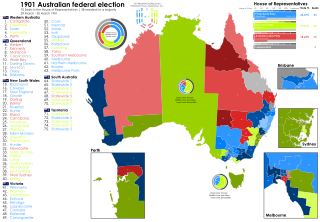
The 1901 Australian federal election for the inaugural Parliament of Australia was held in Australia on Friday 29 March and Saturday 30 March 1901. The elections followed Federation and the establishment of the Commonwealth of Australia on 1 January 1901. All 75 seats in the Australian House of Representatives, six of which were uncontested, as well as all 36 seats in the Australian Senate, were up for election.

The 1903 Australian federal election was held in Australia on 16 December 1903. All 75 seats in the House of Representatives, and 19 of the 36 seats in the Senate were up for election. The incumbent Protectionist Party minority government led by Prime Minister Alfred Deakin retained the most House of Representatives seats of the three parties and retained government with the parliamentary support of the Labour Party led by Chris Watson. The Free Trade Party led by George Reid remained in opposition.
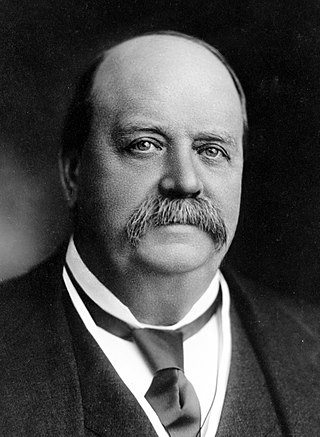
The 1906 Australian federal election was held in Australia on 12 December 1906. All 75 seats in the House of Representatives, and 18 of the 36 seats in the Senate were up for election. The incumbent Protectionist Party minority government led by Prime Minister Alfred Deakin retained government, despite winning the fewest House of Representatives votes and seats of the three parties. Parliamentary support was provided by the Labour Party led by Chris Watson, while the Anti-Socialist Party, led by George Reid, remained in opposition.

Alexander Hay was a New Zealand-born Australian pastoralist, businessman and politician. He was a member of the Australian House of Representatives from 1919 to 1922, representing the electorate of New England for the Nationalist Party (1919–1920), Country Party (1920–1921) and as an independent (1921–1922).
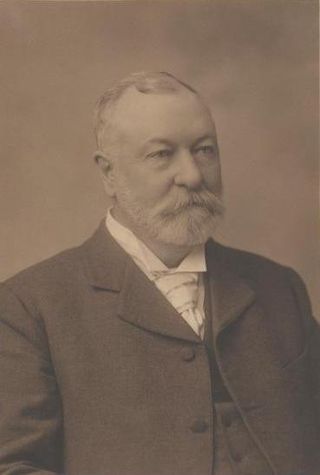
Thomas Macdonald-Paterson was an Australian politician, a member of the Parliament of Queensland, and later, the Parliament of Australia.
The Western Australian Party (WAP) was a short-lived Australian political party that operated in 1906. It was intended as a liberal party to protect the rights of Western Australians and to oppose the increasingly successful Labor Party, and drew its supporters from the Protectionist Party and the Anti-Socialist Party. John Forrest, a minister in Alfred Deakin's government, accepted the leadership of the party. Candidates were endorsed for all electorates in the 1906 federal election, including Forrest, but by the time of the election enthusiasm for the venture had diffused. The party elected Forrest in Swan and William Hedges in Fremantle. In practice they sat as independents and joined the Commonwealth Liberal Party when it formed.

David Storrer was an Australian politician.
This article provides information on candidates who stood for the 1906 Australian federal election. The election was held on 12 December 1906.
This article provides information on candidates who stood for the 1910 Australian federal election. The election was held on 13 April 1910.

Richard Edwards was an Australian politician. He was a Member of the Australian House of Representatives.
The following tables show state-by-state results in the Australian Senate at the 1901 federal election. Senators total 17 Free Trade, 11 Protectionist, and eight Labour. The terms were deemed to start on 1 January 1901. In each state, the first three elected received full six-year terms, and the three senators elected with the lowest number of votes retire after three years.
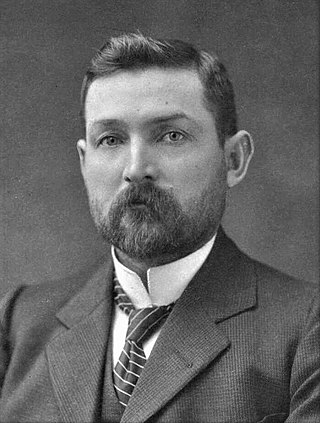
The Watson government was the third federal executive government of the Commonwealth of Australia. It was led by Prime Minister Chris Watson of the Australian Labor Party from 27 April 1904 to 18 August 1904. The Watson government was the first Labor Party national government in both Australia and in the world. Watson was aged just 37 when he became Prime Minister of Australia, and remains the youngest person to have held the post.
The Liberal Party, often known simply as the Liberals, was the name used by a number of political groupings and parties in the Victorian Parliament from the late 19th century until around 1917.
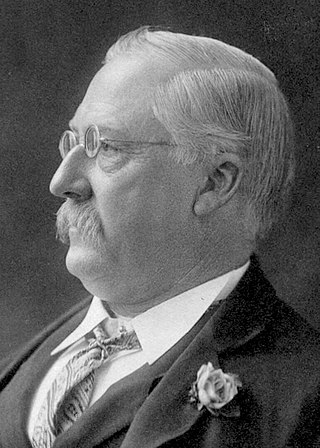
The 1897 Victorian colonial election was held on 14 October 1897 to elect the 17th Parliament of Victoria. All 95 seats in the Legislative Assembly were up for election, though 13 were uncontested.
References
- 1 2 "National Liberal Union of Queensland". Trove. Morning Post.
- 1 2 "The Townsville Chamber of Commerce Jubilee Brochure, 1882–19321" (PDF). p. 2.
- ↑ "THE POLITICS OF EXPEDIENCY QUEENSLAND GOVERNMENT IN THE EIGHTEEN-NINETIES" (PDF).
- ↑ "Alfred Deakin's letters to the London Morning Post". Trove. p. 59.
- 1 2 "COMMONWEALTH OF AUSTRALIA LEGISLATIVE ELECTION OF 16 DECEMBER 1903". Psephos: Adam Carr's Electoral Archive.
- ↑ "NATIONAL LIBERAL UNION". Trove. The Brisbane Courier.
- ↑ "COMMONWEALTH OF AUSTRALIA LEGISLATIVE ELECTION OF 12 DECEMBER 1906". Psephos: Adam Carr's Electoral Archive.
- ↑ "Federal Fusion. Conference Between Leaders". The Sydney Morning Herald. 25 May 1909.